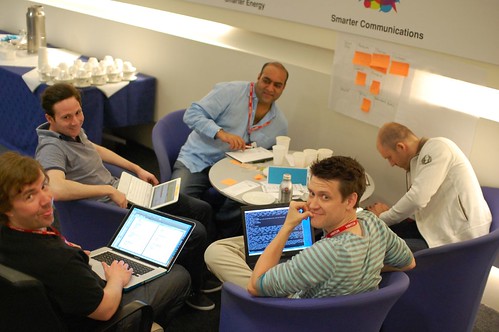How we built a startup in 54 hours
 Last weekend I attended the London Startup Weekend, a 54 hour event hosted at the IBM building on London's Southbank. It was a fantastic event. I met loads of great people, had a lot of fun, and successfully launched a new website! Arianna, Pedro and Debbie have already written up great summaries of the event, so instead I'll be focusing on how our team managed to build and launch our project, automatic event management for twitter.
Last weekend I attended the London Startup Weekend, a 54 hour event hosted at the IBM building on London's Southbank. It was a fantastic event. I met loads of great people, had a lot of fun, and successfully launched a new website! Arianna, Pedro and Debbie have already written up great summaries of the event, so instead I'll be focusing on how our team managed to build and launch our project, automatic event management for twitter.
After forming a group most of Friday evening and Saturday morning was spent discussing ideas around the original pitch of twitter calendar integration. We discussed a whole range of ideas including an event broker service, calendar availability widgets, and a twitter/google calendar mashup. It took until lunch time on Saturday to finalise our idea. We'd settled on a a service that would automatically work out the date of an event mentioned in a tweet and keep track of these events. There were now only 36 hours left!
I got straight to work on the code, using Django. I knew we'd need to pull in tweets and then analyse the dates. Using the python-twitter library I wrote a management command to pull in all tweets containing some specific hashtags every minute.
The next stage was to work out a date from the tweets. A Stack Overflow question suggested two options, parsedatetime library, and some pyparsing example code. I tried the parsedatetime library first, and it gave some fairly good results right away. It wasn't so good at more complicated dates though. I tried the pyparsing example, but unless given just the date string (eg. "Next week" instead of "See you next week") failed to work out a date at all. I did briefly investigate using the NLTK to extract the date from a tweet, but worried about running out of time I gave up on investigating further and stuck with parsedatetime.
While I'd been busy programming Guillume had come up with a great name for our service: tweevents. He'd then set about registering the domain name, setting up a twitter acccount and facebook fan page. Once we had the name sorted I setup an online logo competition offering $25 to the winner, and an hour later we had our logo.

Gabriel worked hard overnight to produce some HTML/CSS for the site, so on Sunday morning I worked on integrating that into the Django project. We worked on adding features to the website, such as links to add events to your google calendar, hCalendar markup, and the ability to filter events by twitter username, and the rest of the day was spent putting a presentation together.
So tweevents is now up and running. Within 54 hours we'd gone from a rough idea into a working website. The presentation we gave gives some details about what's next from the business side, but there's also some things I'd like to get done on the development side. Most importantly improved date parsing. I plan to give the python-dateutil library a try, and failing that go back to look into NLTK in more detail. Guillume's also working hard on improving the library we're already using. Should none of the Python options work I've also come across some great date parsing libraries for other languges, such as Chronic for Ruby and Datejs for Javascript. A Rails or Node.js rewrite might be on the cards! There are also features that we could add, such as Facebook event creation, or filtering the list of events to just your twitter followers, or people you follow.
A huge thanks to Damien, James and Franck who organised and helped out at the event, and made it all so much fun. Of course, tweevents wouldn't be much without the rest of the team. Thanks also to my girlfriend, who was left on her own with our 2 month old daughter for the entire weekend!